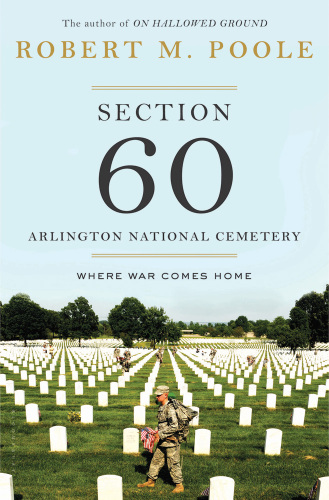
Section 60
Arlington National Cemetery: Where War Comes Home
- اطلاعات
- نقد و بررسی
- دیدگاه کاربران
نقد و بررسی

August 11, 2014
National Geographic writer Poole (On Hallowed Ground) returns to the subject of his previous book, Arlington National Cemetery, this time focusing on one specific area of the cemetery: Section 60, the burial place for the casualties of America’s most recent conflicts. Poole’s approach is poignant and personal: he retells a number of individual stories of soldiers who lost their lives as a direct or indirect result of serving in Iraq and Afghanistan. The cost of war is the thread that ties these tales together, and Poole examines everything from booby traps to friendly fire, from PTSD to POWs/MIAs. Emotional narratives of heroism and valor share space with the voices of those irretrievably damaged by their experiences. The book possesses multiple identities—it’s as much about the people as their final resting place; honoring their sacrifices and condemning the necessity, inevitability, or injustice of their deaths. While book suffers from trying to do too much at once, Poole’s sincerity is never in doubt. As he pieces together his subjects’ last days or considers the intense training and preparation of the honors teams who perform the actual burials, his respect for the military never wavers. An oddly intimate read, this a valuable look at what it costs to serve one’s country. Agent: Gillian MacKenzie, Gillian MacKenzie Agency

Starred review from August 15, 2014
An honorable survey of Arlington National Cemetery's subdivision for military personnel killed in the global war on terror. Former National Geographic executive editor Poole (On Hallowed Ground: The Story of Arlington National Cemetery, 2009) explores Section 60, in the southeast corner of the much-respected burial ground, which is now home to more than 900 deceased American soldiers. From this most active area of Arlington National, he reports the riveting and powerful stories of family members and comrades in heart-rending prose. They include Army Capt. Russell Rippetoe, who was the first fatality to be memorialized from Operation Iraqi Freedom; an eternally grateful heart transplant recipient who religiously visits the grave of her benefactor; a family robbed of a loved one's final viewing due to catastrophic injuries from IEDs; and an inconsolable mother grieving her beloved son. Poole contrasts the palpable frustration and pain of parents burying a child who perished from fratricide or those captured or missing in action with the somber splendor of an Arlington funeral, noting that not all of Section 60's space belongs to those fallen in Iraq and Afghanistan, with over half of the allotted space belonging to veterans who fought in World War II, Korea and Vietnam. As these older graves join with those of more youthful soldiers, the author admits that "they have changed the look and feel of the cemetery," with one visitor dramatically comparing the area to a contemporary memorialization much "like the Vietnam Wall was for their generation." Poole salutes these sobering profiles nobly, with pages of photographs, interviews and personal reflections bringing the human toll of war into vivid and sorrowful focus. The author, who admits to "wandering among the tombstones in Section 60 for several years," imparts a great deal of heartfelt emotion and respect to his tribute of this hallowed ground, observing, "this postage stamp of earth represents something much larger." A momentous and moving follow-up to On Hallowed Ground.
COPYRIGHT(2014) Kirkus Reviews, ALL RIGHTS RESERVED.

Starred review from September 15, 2014
In his latest work, Poole (former executive editor, National Geographic; On Hallowed Ground) looks at the human cost of the wars in Iraq and Afghanistan through the lens of the most active section for burials in Arlington National Cemetery: Section 60. Each chapter recounts the deaths of service members during combat (as well as noncombat or postcombat fatalities) and details the means by which survivors negotiate their grief. For many left behind, Section 60 is a sanctuary where they find occasional solace with fellow mourners and where private rituals transform into displays of public memory. Loved ones attach photos, cards, and trinkets to headstones or place them at grave sites, turning these objects into artifacts commemorating lost lives. Throughout, Poole's insightful writing is touching and demands pauses for reflection. Until a dedicated memorial exists to honor those who gave their lives in Iraq and Afghanistan, Section 60 is the de facto memorial and this book highlights that fact. VERDICT Nonfiction enthusiasts will appreciate this work; it will especially satisfy those with an interest in the human condition. It is a book that will linger in the reader's mind.--Chris Sauder, Round Rock P.L., TX
Copyright 2014 Library Journal, LLC Used with permission.




دیدگاه کاربران